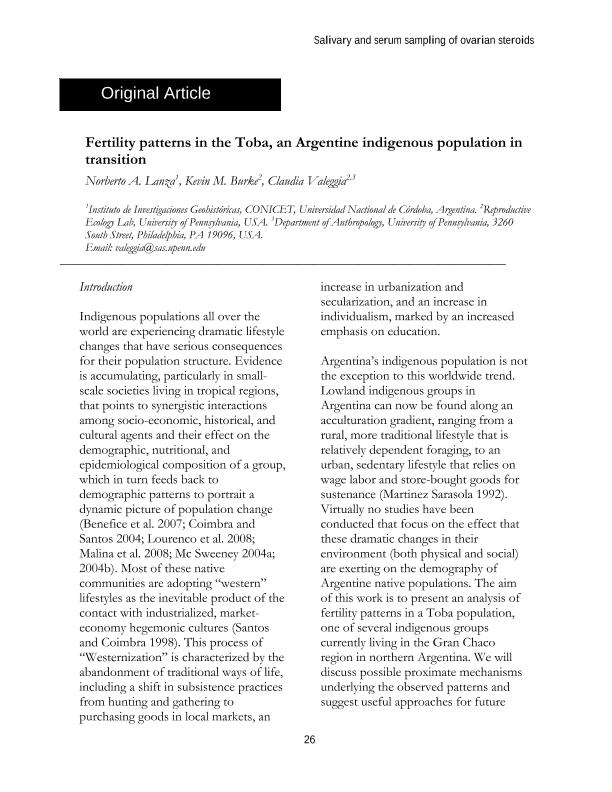Mostrar el registro sencillo del ítem
dc.contributor.author
Lanza, Norberto Alejandro

dc.contributor.author
Burke, Kevin
dc.contributor.author
Valeggia, Claudia
dc.date.available
2017-11-08T16:24:16Z
dc.date.issued
2008-12
dc.identifier.citation
Lanza, Norberto Alejandro; Burke, Kevin; Valeggia, Claudia; Fertility patterns in the Toba, an Argentine indigenous population in transition ; Biosocial Society; Society, Biology & Human Affairs; 73; 1-2; 12-2008; 26-34
dc.identifier.issn
1751-1747
dc.identifier.uri
http://hdl.handle.net/11336/27835
dc.description.abstract
Indigenous populations all over the world are experiencing dramatic lifestyle changes that have serious consequences for their population structure. Evidence is accumulating, particularly in smallscale societies living in tropical regions, that points to synergistic interactions among socio-economic, historical, and cultural agents and their effect on the demographic, nutritional, and epidemiological composition of a group, which in turn feeds back to demographic patterns to portrait a dynamic picture of population change (Benefice et al. 2007; Coimbra and Santos 2004; Lourenco et al. 2008; Malina et al. 2008; Mc Sweeney 2004a; 2004b). Most of these native communities are adopting “western” lifestyles as the inevitable product of the contact with industrialized, marketeconomy hegemonic cultures (Santos and Coimbra 1998). This process of “Westernization” is characterized by the abandonment of traditional ways of life, including a shift in subsistence practices from hunting and gathering to purchasing goods in local markets, an increase in urbanization and secularization, and an increase in individualism, marked by an increased emphasis on education. Argentina’s indigenous population is not the exception to this worldwide trend. Lowland indigenous groups in Argentina can now be found along an acculturation gradient, ranging from a rural, more traditional lifestyle that is relatively dependent foraging, to an urban, sedentary lifestyle that relies on wage labor and store-bought goods for sustenance (Martinez Sarasola 1992). Virtually no studies have been conducted that focus on the effect that these dramatic changes in their environment (both physical and social) are exerting on the demography of Argentine native populations. The aim of this work is to present an analysis of fertility patterns in a Toba population, one of several indigenous groups currently living in the Gran Chaco region in northern Argentina. We will discuss possible proximate mechanisms underlying the observed patterns and suggest useful approaches for future research and issues that deserve closer attention.
dc.format
application/pdf
dc.language.iso
eng
dc.publisher
Biosocial Society
dc.rights
info:eu-repo/semantics/openAccess
dc.rights.uri
https://creativecommons.org/licenses/by-nc-sa/2.5/ar/
dc.subject.classification
Otras Sociología

dc.subject.classification
Sociología

dc.subject.classification
CIENCIAS SOCIALES

dc.title
Fertility patterns in the Toba, an Argentine indigenous population in transition
dc.type
info:eu-repo/semantics/article
dc.type
info:ar-repo/semantics/artículo
dc.type
info:eu-repo/semantics/publishedVersion
dc.date.updated
2017-06-29T13:34:32Z
dc.identifier.eissn
2046-0058
dc.journal.volume
73
dc.journal.number
1-2
dc.journal.pagination
26-34
dc.journal.pais
Reino Unido

dc.description.fil
Fil: Lanza, Norberto Alejandro. Consejo Nacional de Investigaciones Científicas y Técnicas. Centro Científico Tecnológico Conicet - Nordeste. Instituto de Investigaciones Geohistóricas. Universidad Nacional del Nordeste. Instituto de Investigaciones Geohistóricas; Argentina. Universidad Nacional de Córdoba; Argentina
dc.description.fil
Fil: Burke, Kevin. University of Pennsylvania; Estados Unidos
dc.description.fil
Fil: Valeggia, Claudia. University of Pennsylvania; Estados Unidos
dc.journal.title
Society, Biology & Human Affairs
dc.relation.alternativeid
info:eu-repo/semantics/altIdentifier/url/http://www.biosocsoc.org/sbha/previous_issues.html
Archivos asociados
